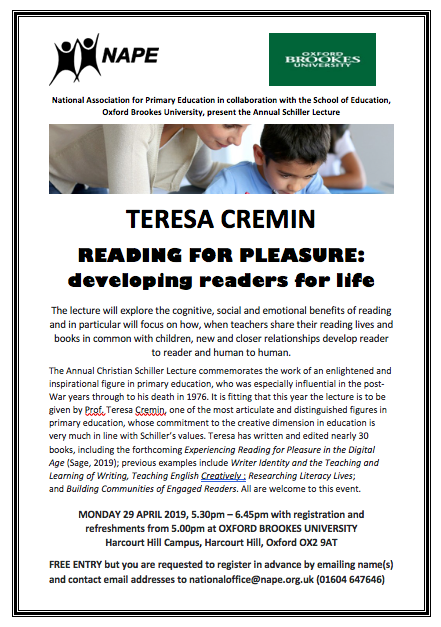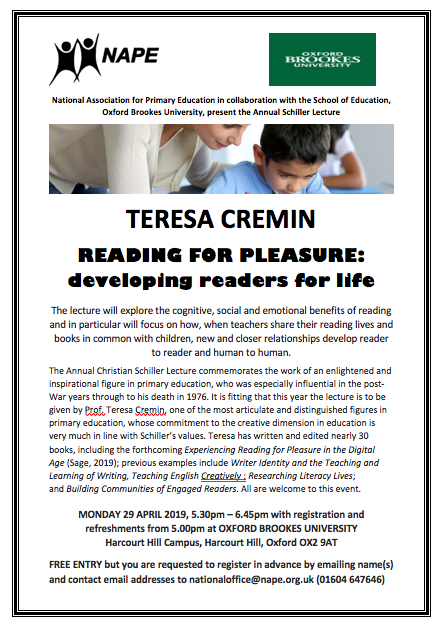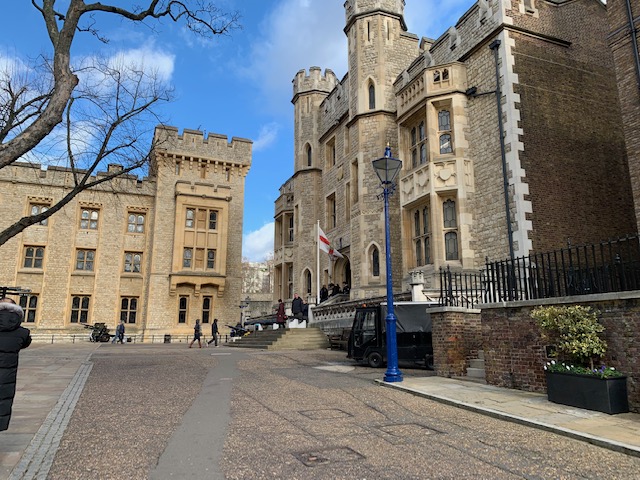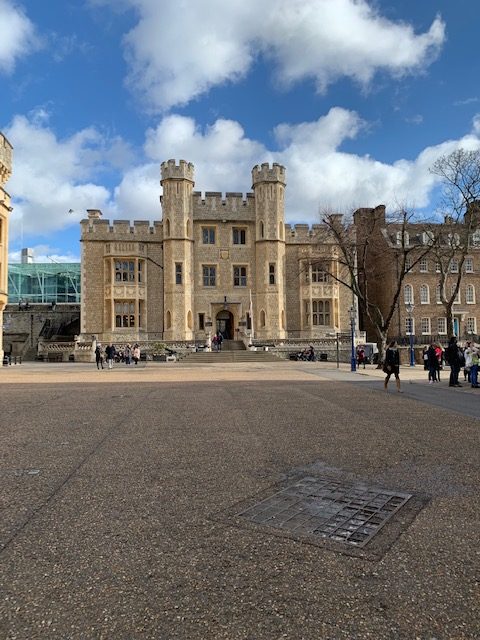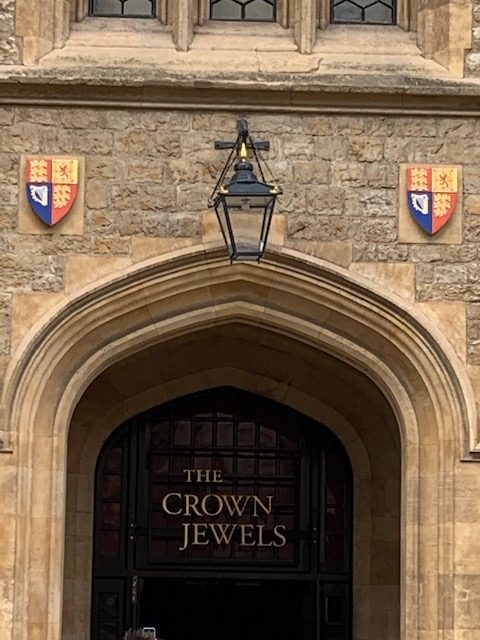Reading for Pleasure with Prof. Teresa Cremin – NAPE 025
National Association for Primary Education in collaboration with the School of Education, Oxford Brookes University, present the Annual Schiller Lecture
READING FOR PLEASURE : developing readers for life
Prof. TERESA CREMIN
The lecture will explore the cognitive, social and emotional benefits of reading and in particular will focus on how, when teachers share their reading lives and books in common with children, new and closer relationships develop reader to reader and human to human.
The Annual Christian Schiller Lecture commemorates the work of an enlightened and inspirational figure in primary education, who was especially influential in the post-War years through to his death in 1976. It is fitting that this year the lecture is to be given by Prof. Teresa Cremin, one of the most articulate and distinguished figures in primary education, whose commitment to the creative dimension in education is very much in line with Schiller’s values. Teresa has written and edited nearly 30 books, including the forthcoming Experiencing Reading for Pleasure in the Digital Age (Sage, 2019); previous examples include Writer Identity and the Teaching and Learning of Writing, Teaching English Creatively ; Researching Literacy Lives; and Building Communities of Engaged Readers. All are welcome to this event.
You can find out more about Teresa Cremin and Reading for Pleasure on the Open University website
http://www.open.ac.uk/people/tmc242#tab1
https://researchrichpedagogies.org/research/team/reading-for-pleasure
National Association for Primary Education
CHRISTIAN SCHILLER CBE, MC, MA
Christian Schiller was born on the 20th September 1895. He went to a prep school and then to Gresham’s School where he was head boy. Military service in the First World War followed and he was wounded in action.
After the war he read mathematics at Cambridge and then studied with Percy Nunn at the London Day Training College before beginning his teaching career. In 1924 he was appointed HMI and then followed a long period of work with the schools in Liverpool where his
contact with poor children and their families was a deeply formative experience. He became District Inspector and later filled this role in Worcestershire.
In 1946 he became Staff Inspector for Primary Education and his influence, often in partnership with his friend Robin Tanner, HMI and etcher, was strongly felt as elementary schools developed into primary schools with a distinctive child centred approach which drew on children’s innate creativity and which recognised the powerful learning which comes from direct experience.
On his retirement in 1955 he began a new career as he created a one year course at the University of London Institute of Education for teachers and heads seconded from their schools. Each course was kept small, no more than 12 people who spent their year visiting schools and in discussion led by Schiller who often remained largely silent until he revealed his vision and optimism about the future in a brief summing up. There were no examinations or required coursework yet, as this writer will testify, everyone worked extremely hard. The course was hugely influential and most of his former students have gone on to hold senior leadership positions in education.
Christian Schiller died on the 11th February 1976. The following year the first memorial lecture was presented in London and the annual lectures, now organised by the National Association for Primary Education, continue to the present day. We are pleased to be able to celebrate the work of this great man who contributed so much to the principles and practice of primary education. To those who say look at us, obsessed with children being coached to pass tests, schools competing rather than co-operating, I reply , look more deeply , beyond today’s political froth. Schiller’s work continues and one day, will prevail.
—————————————————————————————
‘Christian Schiller in his own words’ was published by the Association in 1979. The book is available price £5.00 from the NAPE national office.
Education A Manifesto for Change with Richard Gerver – NAPE 024
Richard Gerver has been described as one of the most inspirational leaders of his generation. He is an award-winning speaker, bestselling author and world-renowned thinker.
Richard began his career in education, most notably as headmaster of the failing Grange Primary School. In just two years, famously transformed into one of the most acclaimed learning environments in the world. He was celebrated by UNESCO and the UK Government for its incredible turnaround.
Richard has since transitioned to the global stage where he uses his trademark humour and natural style to deliver passionate, provocative and authentic speeches. He draws upon the first-hand experiences and unique insights garnered from frontline education to explore the links between great leadership, human potential, change and innovation. His ability to connect experiences across many seemingly different environments helps people to expand their thinking and perception of potential. It is this authenticity and uniqueness which has helped Richard win him global acclaim and invitations to speak on the most recognised stages, including TED, the RSA and BBC radio.
The three core principles underpinning Richard’s philosophy are communication, empowerment and impact. He argues that great leadership is first and foremost about serving the needs of the people who work for you. His mantra: systems and structures change nothing; people do.
Having successfully transitioned from teacher to thought leader, Richard has had the opportunity to regularly advise governments and major corporations globally, including Google, Visa, Microsoft, Morgan Stanley, Deloitte, Harrods, Puig and Telefonica. His unique experience and insight into realising human potential also see him working in elite sport, with Olympic and Paralympic coaches, EPL Soccer coaches, England Golf and professional cricket teams. He has recently started working with the British music industry to help develop a capacity for forward, proactive and sustainable change.
Richard is also a bestselling author. His first book, Creating Tomorrow’s Schools Today (now in its second edition), has become a seminal text around the world for those engaged in the transformation of education. His other books are explorations of human potential, leadership and success. In Change and Simple Thinking, Richard explores the world beyond school, through the eyes of an educator. Both have received critical and public success; both achieving global bestseller status. All his books have been translated into a multitude of languages including Spanish, Chinese and Korean. Richard will also be publishing a new book: Education: A Manifesto for Change, to be published in April 2019, this book will explore how our school system can be made fit for purpose in our turbulent 21st-century world.
Most importantly, Richard is always humbled to be able to share his lifelong commitment to living, learning and laughing.
Twitter @richardgerver
Take a break – NAPE 023
Here are the details for the Christian Schiller Lecture 2019.
We are taking a 2 week break for the Easter Holidays but will be back and revitalised in the summer term.
Remember to subscribe to the podcast on your favourite app or platform and to keep up to date with all the content sign up to the Education on Fire newsletter.
To find out more information about the Primary Music on Fire Membership Site click the link below. It is currently the cheapest price it will ever be available at so jump in now and find out more!
I would like to say a big thank you to NAPE for their support and sponsorship. It is because of them that Education on Fire can bring you so much FREE content and build this wonderful community, so please do join the newsletter on the link above to get all the inspiration you can.
4th Ultimate Wellbeing in Education Conference – NAPE 022
NAPE was recently invited to the 4th Ultimate Wellbeing in Education Conference in London. Robert Young – General Secretary/Interim Chair and Mark Taylor attended.
In this episode Mark discusses his thoughts about the event and also provides an update on the Christian Schiller Lecture 2019 with guest speaker Prof. Teresa Cremin.
Christian Schiller Lecture 2019
FREE ENTRY but you are requested to register in advance by emailing name(s) and contact email addresses to nationaloffice@nape.org.uk (01604 647646)
MONDAY 29 APRIL 2019, 5.30pm – 6.45pm with registration and refreshments from 5.00pm
OXFORD BROOKES UNIVERSITY Harcourt Hill Campus, Harcourt Hill, Oxford OX2 9AT
‘The 4th Ultimate Wellbeing in Education Conference with Damian Hinds MP.
This landmark event will explore ways in which both student wellbeing and staff wellbeing can be improved in schools, colleges and universities.
Through discussions and advice from a range of leading wellbeing and education experts, delegates will leave with a thorough understanding of the need for wellbeing education and practical ideas on how to implement in their school.
Great networking opportunities will exist with IPEN members and senior leaders and teachers involved in the implementation and day to day management of wellbeing within their schools and universities.
This one-day event hosted by Sir Anthony Seldon (Vice Chancellor of the University of Buckingham, President of IPEN, and co-founder of Action for Happiness) the event will begin with a keynote address by the Secretary of State for Education, Damian Hinds MP.
Tower of London – NAPE 021
Following my interview with Lucie Parkes – Formal Learning Manager at Historic Royal Palaces (episode NAPE 011), I was invited to shadow a school visit around the Tower of London.
It was such a delight to see one of their education projects in action and witness first hand how a yr3 class were captivated by the stories and history of such a magnificent historical landmark.
In this this episode you will hear from the teachers and children who took part in the tour around the Tower of London.



